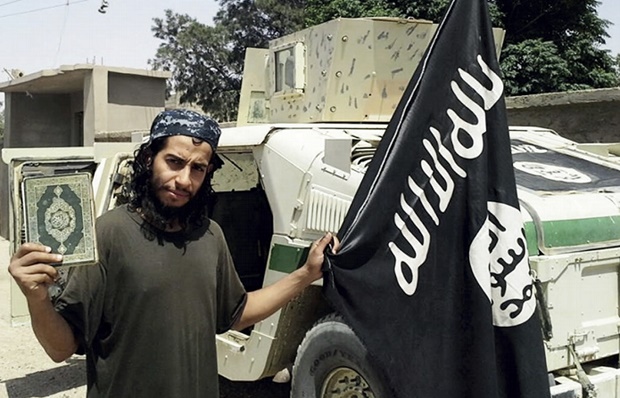Religious rights report notes rise of ‘Islamist hyper-extremism’

This undated image made available in the Islamic State’s English-language magazine Dabiq, shows Belgian Abdelhamid Abaaoud holding a Quran and the ISIS flag. The flag displays the Islamic creed or shahada. Abaaoud the Belgian jihadi suspected of masterminding deadly attacks in Paris was killed in a police raid on a suburban apartment building. AP
Religious liberty has worsened around the world in the last two years, with violent Islamist attacks taking place in one out of five countries, from Sweden in northern Europe to Australia in Oceania and including 17 African countries, according to a much-awaited report by the Aid to Church in Need (ACN), a Vatican foundation that provides relief to Christians and non-Christians in high-conflict areas.
The ACN biennial report titled “Religious Freedom in the World” said religious freedom had declined in 11 of 23 worst-offending countries such as Syria, Iraq, North Korea and China. The report was released simultaneously today, November 15 (Philippine time), in the Vatican and in Manila where ACN has opened a Philippine office at the Catholic Bishops Conference of the Philippines (CBCP) complex in Intramuros.
The situation is very grave in Syria and Iraq because of “hyperextremism” as shown by the genocidal campaign of the Islamic State (Isis) to wipe out non-Muslim populations, the report noted.
READ: Dozens dead as ISIS expels Syria regime from Raqa province / Syria rebels capture emblematic ISIS stronghold / ‘ISIS child bomber’ kills at least 51 at Turkey wedding
The last two years have seen the “emergence of a new phenomenon …. (of) Islamist hyper-extremism, a process of heightened radicalization, unprecedented in its violent expression.”
Extreme violence, cruelty
The ACN report said that hyper-extremism is characterized by “an extremist creed and a radical system of law; systematic attempts to annihilate or drive out all groups that don’t conform to their outlook, including co-religionists; cruel treatment of victims; use of social media to recruit followers and to intimidate opponents by parading extreme violence.”
The report added that hyper-extremism has had a “global impact—enabled by affiliate extremist groups and well-resourced support networks.”
“In parts of the Middle East, including Syria and Iraq, this hyper-extremism is eliminating all forms of religious diversity and is threatening to do so in parts of Africa and the Asian Sub-continent,” the report said. “The intention is to replace pluralism with a religious mono-culture.”
Global refugee explosion
Extremism has resulted in a global refugee crisis, the ACN report pointed out.
“Islamist extremism and hyper-extremism, observed in countries including Afghanistan, Somalia and Syria has been a key driver in the sudden explosion of refugees which . . . or 2015 went up by 5.8 million to a new high of 65.3 million.”
But the report noted that “mainstream Islamic groups” were countering hyperextremism by condemning the latter’s violence.
In Hindi India, Islamic Pakistan and Buddhist Burma, “where one particular religion is identified with the nation-state,” there have been “stringent religious freedom restrictions” on minority religions, the report noted.
Eritrea, North Korea, China
Meanwhile totalitarian police states Eritrea and North Korea have continued to deny religious liberties and subjected religionists to “long imprisonment without trial, rape and murder.”
In China and Turkmenistan, there have been crackdowns on churches that refuse to toe the party line.
More than 2,000 churches have had their crosses demolished in Zhejang and nearby Chinese provinces, the report said.
In the Philippines, extremist Muslim groups such as the Abu Sayyaf have kidnapped and beheaded Christians in Basilan, Sulu and Tawi-tawi, the report said.
READ: Head of ‘Abu Sayyaf captive’ dumped on Sulu street – police / 2 soldiers killed in ambush by suspected Abu Sayyaf / Abus mock Duterte, behead Canadian
In Manila, Fr. Martin Barta, ecclesiastical assistant of the ACN, said the report will be presented to Pope Francis, the UN and governments.
Established under the aegis of Pope Pius XII in 1947 to aid Christians in the Iron Curtain persecuted by Communists, ACN has evolved into a relief organization aiding persecuted Christians and non-Christians.
Pope Benedict XVI made ACN “a foundation of pontifical right.” Its president is Vatican-based Cardinal Mauro Piacenza and the ACN International executive president is German Baron Johannes Freiherr Heereman of the Knights of Malta.
This year also, ACN is spending 160 million Euros ($172 million) for its global relief and assistance operations, Heereman said.
Heereman himself was in Asia when the ACN report was released to open country offices in Korea and the Philippines.
The national head of the Philippine ACN is CBCP president and Lingayen-Dagupan Archbishop Socrates Villegas.
With the opening of ACN in Manila, the Philippine Catholic Church will now help in mobilizing resources to aid persecuted Christians around the world, said Villegas.